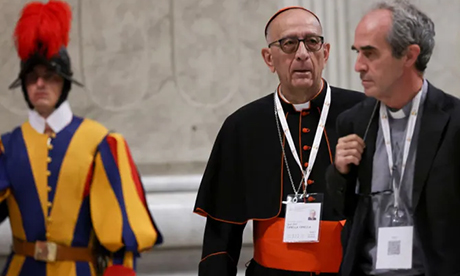Perhaps it is in the very nature of the Synod on Synodality to take steps back after having taken several steps forward. But the tone of the opening days of the synod’s final general assembly makes it apparent that, for the moment, there is no talk of revolution within the Church.
That tone was set days before the gathering got underway this week at the Vatican, when in his speech in Belgium on Sept. 27, Pope Francis said that the synod wasn’t meant to advance what he called “trendy reforms.”
Now it seems clear that while the delegates may discuss many things over the next three weeks, nothing will be decided. There will be no doctrinal changes. No diminution of the role of the bishop. No rush to resolve the question of opening the diaconate to women.
Instead, this month’s real challenge may well be how to manage the expectations of those hoping and pushing for sweeping changes.
Cardinal Jean-Claude Hollerich, the synod’s general rapporteur, alluded to that danger at the end of last year’s assembly when he noted that many would be disappointed if women were not given a greater role in the Church.
Change unlikely
But is a major change in Church governance in the offing? That seems unlikely.
Pope Francis himself, in his remarks at the opening of this year’s assembly Oct. 1, emphasised that “the presence at the Assembly of the Synod of Bishops of members who are not bishops does not diminish the episcopal dimension of the assembly,” a reference to the dozens of laypeople and women religious participating as voting delegates.
He added, with evident annoyance, that suggestions to the contrary were due to “some storm of gossip that went from one side to the other.” Indeed, there is not even “some limit or derogation to the authority of the individual bishop or the episcopal college,” he said.
Rather, the pope tried to clarify, the assembly “indicates the form that the exercise of episcopal authority is called to take in a Church aware of being constitutively relational and therefore synodal.” In short, it is a “modus gubernandi,” a way of governing. Yet it remains a government rather than an open forum.
There have been plenty of other signals that no revolution is imminent.
For example, there was Cardinal Víctor Manuel Fernández, the prefect of the Dicastery for the Doctrine of the Faith, who in his report on new ministries said that Pope Francis does not consider the moment for the female diaconate to be “ripe.”
The reflection continues, in other words. The Church will endeavor to give more space to women in decision-making roles, but further discussion is needed as to any kind of ordained ministry — something the pope had already indicated in his in-flight press conference Sept. 29 on his way back from Belgium.
Also, in their intermediate reports to the synod, the study groups commissioned by the pope to examine questions of a female diaconate and other controversial issues showed a certain prudence on the part of the bishops in addressing doctrinal questions.
The bishops may concede to giving the laity a greater say in decision-making, perhaps, but not when it comes to doctrinal matters.
The study group tasked with examining the role of the “bishop-judge” is a clear example. Pope Francis has placed the bishops at the center of the marriage annulment process, asking — indeed almost imposing — that they are the final judges.
But the bishops called to speak on the issue have instead reaffirmed that the bishop, in some cases, ought to have the option of delegating that responsibility to regional and national courts that “could guarantee great impartiality in decisions.” Is this a step back from what Pope Francis already has requested?
And when it comes to making the process of selecting bishops more transparent, much depends on how the apostolic nuncio in each country exercises the selection process.
There is a call for “more attention to the local Church” and “more involvement of the local Church,” but this is a question of approach, not revolutionary change. Read more
- Andrea Gagliarducci is an Italian journalist for Catholic News Agency and Vatican analyst for ACI Stampa. He is a contributor to the National Catholic Register.
News category: Analysis and Comment.




